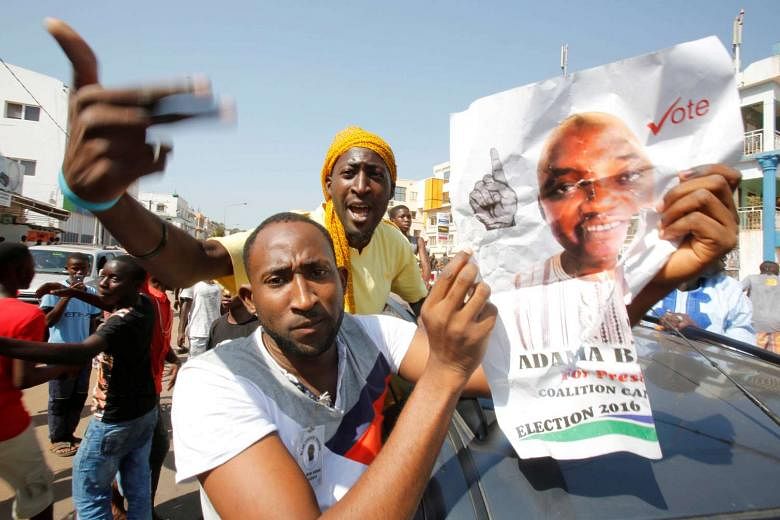BANJUL, Gambia (AFP) - Gambian President-elect Adama Barrow on Saturday (Dec 10) called on longtime leader Yahya Jammeh to drop his challenge to last week's election and appealed for calm following the dramatic political U-turn.
Jammeh on Friday declared he no longer accepted the results of the Dec 1 vote, in a stunning turnaround that sapped hopes for a peaceful political transition for the west African state.
Signs of a massive security ramp-up multiplied across the capital Banjul on Saturday, while US, UN and African authorities urged Gambians against violence and respect the election outcome.
Jammeh, 51, cited "unacceptable errors" by election authorities and called for new polls.
"In the same way that I accepted the results faithfully believing that the Independent Electoral Commission was independent and honest and reliable, I hereby reject the results in totality," Jammeh said in a speech broadcast on state television.
"Let me repeat: I will not accept the results based on what has happened," he added.
Jammeh, who has led the former British colony for 22 years, warned Gambians not to take to the streets to protest his decision.
Latest official figures gave Barrow 43.29 per cent of the votes in the presidential election, while Jammeh took 39.64 per cent. The turnout was 59 per cent.
Those figures reflect a correction issued Monday by election authorities, showing a slimmer-than-thought victory for Barrow, of just over 19,000 votes.
Jammeh pointed to that polling error, claiming that numerous voters had not been able to cast their ballots.
"This is the most dubious election we ever had in the history of this country," he said.
"We will go back to the polls because I want to make sure every Gambian votes under an electoral commission that is impartial, independent, neutral and free from foreign influence," he said.
Barrow, a consensus candidate backed by a coalition of opposition groups, on Saturday urged Jammeh to accept defeat and argued he had no legal standing for the turnaround.
"I wish to inform you that the outgoing president has no constitutional authority to reject the results of the elections and order for fresh elections to be held," Barrow told journalists after an opposition meeting at his home.
"I urge him to change his current position and accept the verdict of the people in good faith for the sake of the Gambia our homeland." Barrow also appealed to his own supporters to act with "discipline and maturity."
The US State Department lashed Jammeh's change of heart a "reprehensible and unacceptable breach of faith with the people of The Gambia and an egregious attempt to undermine a credible election process and remain in power illegitimately."
In a joint statement, the west African regional grouping Ecowas, the African Union and the United Nations urged Gambians including armed forces to "reject violence and peacefully uphold the will of the people as expressed through the ballot box".
Liberian President Ellen Johnson Sirleaf, who was leading an Ecowas mission, was blocked from entering Gambia on Saturday.
Senegalese Foreign Minister Mankeur Ndiaye said it was Jammeh who had "prevented the landing" of Sirleaf's plane.
Jammeh's swift concession of defeat on Dec 2 stunned observers and led to celebrations in the country.
Though stable under Jammeh's rule, the country of just 1.99 million people still faces daunting problems, including endemic poverty.
Many Gambians had tired of Jammeh's unpredictable behaviour, including the declaration of an Islamic republic in a country with a history of religious tolerance, and its withdrawal from the Commonwealth and the International Criminal Court.
The perception that Jammeh simply took over businesses and properties for his personal gain also angered many, while police harassment and impunity by the security services fed growing resentment.
Pressure to prosecute Jammeh and top figures in his administration, who have been accused of widespread human rights violations, had been one of the key challenges for the new government.
Barrow had vowed to set up a South Africa-style truth commission but ruled out a political "witch hunt" and promised that his predecessor would be able to "live in Gambia like any ordinary citizen".
Dozens of opposition activists, including the leader of the United Democratic Party (UDP) had already been freed from prison on bail this week.

